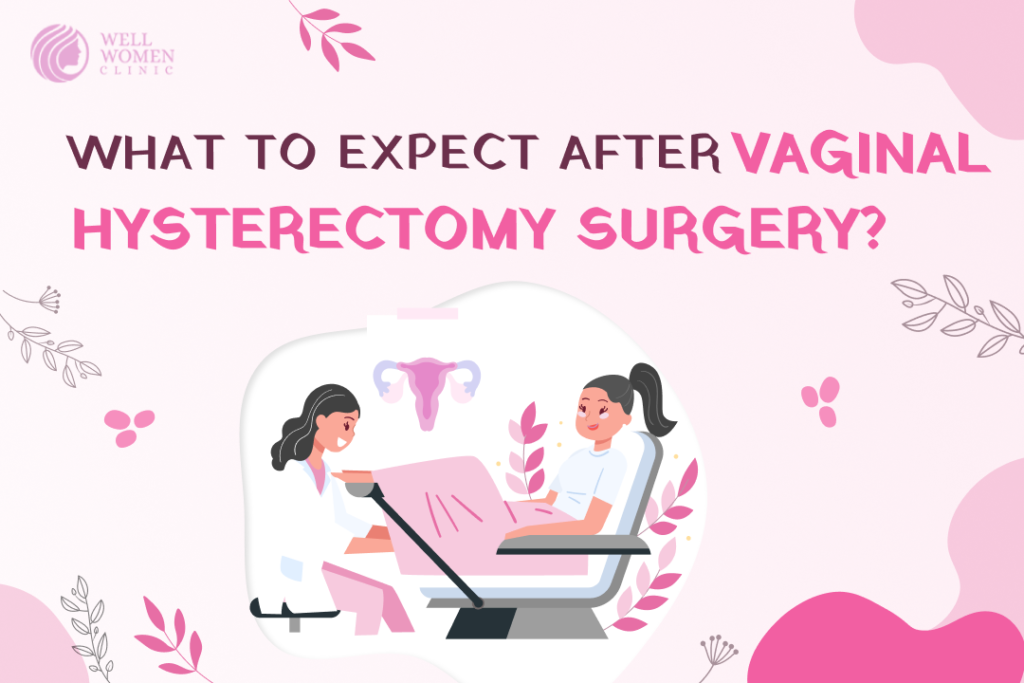The uterus may be removed surgically via the vagina in a technique called a vaginal hysterectomy. A vaginal hysterectomy is less invasive than an abdominal one, which requires an incision in the lower abdomen and results in a shorter hospital stay, reduced cost, and quicker recovery time. However, vaginal hysterectomy may not be an option for you depending on the size and form of your uterus or the underlying cause of the procedure. In addition to the vaginal hysterectomy, your doctor may suggest an abdominal hysterectomy as well.
Post-vaginal Hysterectomy Risks
In most cases, vaginal hysterectomy or laparoscopic hysterectomy is risk-free, but the hazards associated with surgery are universal. Some of these risks are related to having a vaginal hysterectomy:
- Strenuous bleeding.
- Clots of blood form in the lungs or the legs.
- Infection
- An injury to the organs that are nearby.
- Unfavourable response to anaesthesia.
Suppose you have severe pelvic Pain or scar tissue (also known as pelvic adhesions). In that case, your surgeon may be forced to switch from a vaginal hysterectomy to an abdominal or laparoscopic hysterectomy while they are performing the procedure on you.
Post Operation Situations:
Immediately After The Operation:
- You will spend the night in the hospital after surgery and will be monitored for one to two hours in the recovery area.
- There are cases when the woman may go home on the same day as the operation. If you’re in agony, you’ll take some pills.
- After receiving medical attention, you will be encouraged to stand and walk about as quickly as possible.
- After a hysterectomy, you will need to use sanitary pads since you may have bloody vaginal flow for many days to weeks.
A Few Weeks After:
Most women find that their symptoms of bleeding, pelvic discomfort, and stomach bloating, which led them to seek a hysterectomy, disappear once they no longer have a uterus. If these symptoms can be alleviated, it may lead to an improved sex life for women.
Nonetheless, if the ovaries were taken out, a few additional obstacles would need to be overcome. You will likely have menopausal symptoms, such as hot flashes and mood swings, after having a hysterectomy, even if you have not yet gone through menopause. Your body is going through a period of adaptation in response to fluctuating hormone levels. Additional possible side effects include dryness of the vaginal canal and a decline in sexual desire or pleasure. Since physical changes may be so profound, hormone replacement medication is often started in the hospital and continued after the woman has been discharged.
Some sadness is to be expected. Experiencing grief at the loss of your uterus and fertility is normal. Depression is common after surgery for serious diseases like cancer. Such emotions are typical. See a private gynaecologist in London and a therapist specialising in mental health to discuss them. However, the vast majority of post-hysterectomy women report feeling relieved.
Sensual Experience:
Patients who have a vaginal hysterectomy have a quicker and less painful recovery time compared to those who have an abdominal hysterectomy. Depending on the severity of the injury, complete healing might take up to four weeks. Do not engage in vaginal intercourse or lift any weights weighing more than 20 pounds (9.1 kilograms) until six weeks have passed after surgery, even if you feel good.
Mental And Emotional Conditions:
One possible benefit of having your uterus removed after a hysterectomy is a reduction in pelvic discomfort and/or the absence of heavy menstrual flow or the need for period pain treatment. Many women worry that losing their uterus may affect their ability to have sexual relations, but this is not the case. On the other hand, some women report increased sexual pleasure following hysterectomy, perhaps due to the absence of discomfort during sexual activity.
It’s common to have feelings of loss and sadness after a hysterectomy. Another possibility is that you’re depressed since you lost your fertility and want to have a baby someday. See a doctor if persistent sorrow or other unpleasant emotions prevent you from taking pleasure in normal activities.
Your ability to conceive children and/or have periods or period pain treatment will end when you undergo a hysterectomy. If you have not yet entered menopause before having your ovaries removed, you will enter menopause immediately after the operation. Vaginal dryness, flushing, and/or night sweats may be symptoms you experience. Medications might be prescribed by your private gynaecologist in London to alleviate these issues. Even if you don’t have any symptoms, your doctor may still suggest hormone treatment. For more information, contact our private Gynaecologist at Well Women’s Clinic today!





